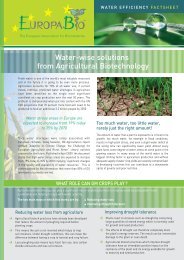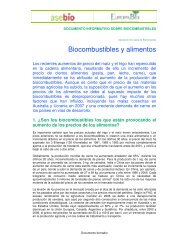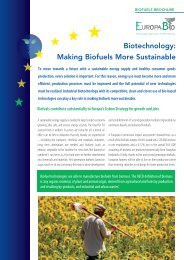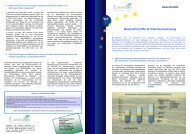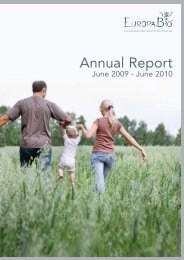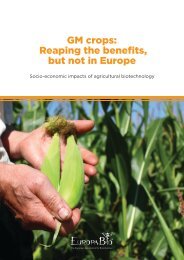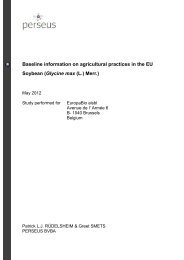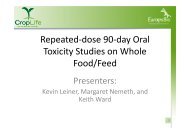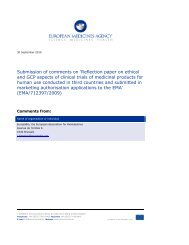44 years of delays in the EU Approval of GM Products - Europabio
44 years of delays in the EU Approval of GM Products - Europabio
44 years of delays in the EU Approval of GM Products - Europabio
Create successful ePaper yourself
Turn your PDF publications into a flip-book with our unique Google optimized e-Paper software.
5 November 2012<br />
<strong>44</strong> <strong>years</strong> <strong>of</strong> <strong>delays</strong> <strong>in</strong> <strong>the</strong> <strong>EU</strong> <strong>Approval</strong> <strong>of</strong> <strong>GM</strong> <strong>Products</strong><br />
The <strong>EU</strong>’s strict laws for <strong>GM</strong> products state that approval decisions have to be taken quickly once<br />
a product is declared safe by <strong>in</strong>dependent scientists. However, <strong>the</strong> European Commission<br />
rout<strong>in</strong>ely <strong>delays</strong> such decisions, <strong>of</strong>ten for <strong>years</strong>.<br />
The comb<strong>in</strong>ed delay for all <strong>GM</strong> products? <strong>44</strong> <strong>years</strong>.<br />
Steps <strong>in</strong> <strong>the</strong> <strong>EU</strong> approval system for <strong>GM</strong>OS: How does it work? And does it work?<br />
The <strong>EU</strong> has one <strong>of</strong> <strong>the</strong> world’s strictest approval procedures for <strong>GM</strong> products. First, <strong>the</strong> European Food Safety Authority (EFSA)<br />
makes an extensive scientific risk assessment. If EFSA f<strong>in</strong>ds <strong>the</strong> product <strong>in</strong> question as safe as its non-<strong>GM</strong> counterpart, a<br />
political decision must <strong>the</strong>n be made. This decision-mak<strong>in</strong>g phase is adm<strong>in</strong>istered by <strong>the</strong> European Commission and <strong>in</strong>volves<br />
<strong>the</strong> Member States. <strong>EU</strong> legislation requires <strong>the</strong> European Commission to stick to specific timel<strong>in</strong>es i :<br />
It has a maximum <strong>of</strong> 3 months to ask <strong>the</strong> Member State representatives to vote.<br />
If <strong>the</strong>y vote and do not reach a qualified majority, <strong>the</strong> Commission has to hold ano<strong>the</strong>r vote with<strong>in</strong> 2 months ii .<br />
In exceptional circumstances, <strong>the</strong> applicant and <strong>the</strong> Commission may agree to f<strong>in</strong>d ano<strong>the</strong>r solution (which may result<br />
<strong>in</strong> a delay) iii .<br />
The timel<strong>in</strong>es foreseen <strong>in</strong> <strong>EU</strong> legislation are regularly exceeded. This document expla<strong>in</strong>s why this matters.<br />
Timel<strong>in</strong>es for <strong>GM</strong> products with a positive EFSA safety op<strong>in</strong>ion and await<strong>in</strong>g Commission action:<br />
Timel<strong>in</strong>es not compliant with <strong>EU</strong> law Timel<strong>in</strong>es compliant for <strong>the</strong> moment <strong>Products</strong> for <strong>EU</strong> cultivation<br />
Product<br />
Application<br />
Received by<br />
EFSA iv<br />
Publication <strong>of</strong><br />
EFSA Op<strong>in</strong>ion<br />
Months (m) and days (d)<br />
wait<strong>in</strong>g for <strong>the</strong><br />
Commission to schedule<br />
first vote v :<br />
maximum: 3 months<br />
Months (m) and days (d)<br />
wait<strong>in</strong>g for <strong>the</strong><br />
Commission to schedule<br />
second vote vi<br />
maximum: 2 months<br />
1507 maize (c) 11/2000 03/03/2005<br />
voted after 47 m 22 d<br />
(25/02/09)<br />
<strong>44</strong> m 11 d and count<strong>in</strong>g<br />
Bt11 maize (ipc) 05/1996 19/05/2005<br />
voted after 45 m 06 d<br />
(25/02/09)<br />
<strong>44</strong> m 11 d and count<strong>in</strong>g<br />
LL Rice62 (ffip) 08/2004 30/10/2007 60 m 06 d and count<strong>in</strong>g<br />
NK603 maize (ffipc) 08/2005 11/06/2009 40 m 25 d and count<strong>in</strong>g<br />
MON810 maize (ffipc) (renewal) 06/2007 30/06/2009 40 m 06 d and count<strong>in</strong>g<br />
MS8xRF3 rapeseed(ff) (renewal) 06/2007 22/09/2009 37 m 14 d and count<strong>in</strong>g<br />
GT73 oilseed rape(ffip) (renewal) 06/2007 15/12/2009 34 m 21 d and count<strong>in</strong>g<br />
MON863 maize (ffip) (renewal) 06/2007 30/03/2010 31 m 06 d and count<strong>in</strong>g<br />
MON89034x1507xMON88017x59122 maize<br />
(ffip)<br />
10/2008 27/09/2010 25 m 09 d and count<strong>in</strong>g<br />
MON89034x1507xNK603 maize (ffip) 02/2009 27/09/2010 25 m 09 d and count<strong>in</strong>g<br />
MON531 cotton (ffip) (renewal) 06/2007 16/09/2011 13 m 20 d and count<strong>in</strong>g<br />
MON88017 maize (c) 04/2008 10/11/2011 11 m 26 d and count<strong>in</strong>g<br />
MON1<strong>44</strong>5 cotton (ffip) (renewal) 06/2007 16/12/2011 10 m 20 d and count<strong>in</strong>g<br />
GA21 maize (ffipc) 07/2008 16/12/2011 10 m 20 d and count<strong>in</strong>g<br />
MON 531xMON1<strong>44</strong>5 cotton (ff) (renewal) 06/2007 28/03/2012 7 m 8 d and count<strong>in</strong>g<br />
MON 40-3-2 soybean (c) 11/2005 21/06/2012 4 m 15 d and count<strong>in</strong>g<br />
Bayer MS8, RF3& MS8x RF3 oilseed rape<br />
(ffip) (extension <strong>of</strong> scope)<br />
23/06/2010 26/09/2012 1 m 10 d and count<strong>in</strong>g<br />
MON87705 soybean (ff) 25/02/2010 30/10/2012 0 m 5 d and count<strong>in</strong>g<br />
Accumulated undue delay per column <strong>44</strong>6 m 20 d 88 m 22 d<br />
ACCUMULATED<br />
UNDUE DELAY vii<br />
534 months 42 days<br />
= <strong>44</strong>.6 <strong>years</strong><br />
Days after<br />
Council/ Appeal<br />
vote - wait<strong>in</strong>g for<br />
approval
Why does this matter?<br />
The <strong>EU</strong> is not currently able to produce all it needs. It imports gra<strong>in</strong> commodities worth billions <strong>of</strong> euros every year, especially<br />
soy and maize to feed European farm animals viii . The <strong>EU</strong> has outsourced arable land nearly <strong>the</strong> size <strong>of</strong> Germany’s entire<br />
territory to o<strong>the</strong>r parts <strong>of</strong> <strong>the</strong> world to produce our animals’ food. Most <strong>of</strong> <strong>the</strong> imported animal feed is from <strong>the</strong> Americas and is<br />
genetically modified.<br />
If a given <strong>GM</strong> product is approved for cultivation <strong>in</strong> <strong>the</strong> Americas, but it is not (yet) approved for import <strong>in</strong>to <strong>the</strong> <strong>EU</strong>, this can<br />
result <strong>in</strong> serious problems for <strong>in</strong>ternational trade. Shipments with traces <strong>of</strong> products not yet approved <strong>in</strong> <strong>the</strong> <strong>EU</strong> could be turned<br />
away from European ports or diverted to Asia where demand is even higher.<br />
The backlog <strong>of</strong> <strong>EU</strong> authorisations for <strong>GM</strong> imports, comb<strong>in</strong>ed with <strong>the</strong> fact that European farmers are not given <strong>the</strong> choice to<br />
grow most <strong>GM</strong> crop varieties, contributes to ris<strong>in</strong>g food prices, underm<strong>in</strong>es <strong>the</strong> competitiveness <strong>of</strong> European farmers, <strong>in</strong>creases<br />
<strong>the</strong> <strong>EU</strong>’s import dependency, and creates legal uncerta<strong>in</strong>ty for import operators.<br />
The <strong>GM</strong> product backlog <strong>of</strong> <strong>the</strong> <strong>EU</strong> approvals system<br />
<strong>GM</strong> Product submissions and authorisations<br />
80<br />
Number <strong>of</strong> products<br />
70<br />
60<br />
50<br />
40<br />
30<br />
20<br />
10<br />
0<br />
18<br />
7<br />
2 4<br />
0 2<br />
Do you want to know more?<br />
23<br />
12 12 14<br />
9<br />
11<br />
6 8<br />
4 5<br />
7 6<br />
2004 2005 2006 2007 2008 2009 2010 2011 2012<br />
Status <strong>of</strong> overall <strong>GM</strong> crop product approvals<br />
48 <strong>GM</strong> crop products are authorised <strong>in</strong> total<br />
74 <strong>GM</strong> crop products <strong>in</strong> <strong>the</strong> authorisation system:<br />
<strong>in</strong> EFSA<br />
18 await<strong>in</strong>g Commission/Member State action<br />
Background: S<strong>in</strong>ce <strong>the</strong> current authorisation<br />
framework is <strong>in</strong> place (2004), <strong>in</strong> any given year more<br />
<strong>GM</strong> applications have been submitted (green) than<br />
authorisation decisions were made (yellow). This results<br />
<strong>in</strong> an ever <strong>in</strong>creas<strong>in</strong>g backlog. Meanwhile <strong>GM</strong> products<br />
are be<strong>in</strong>g adopted at a rapidly <strong>in</strong>creas<strong>in</strong>g rate <strong>in</strong> many<br />
third countries which export <strong>the</strong>ir commodities to <strong>the</strong><br />
<strong>EU</strong>. Unless <strong>the</strong> <strong>EU</strong> changes <strong>the</strong> pace <strong>of</strong> its approvals,<br />
<strong>the</strong> total number <strong>of</strong> products wait<strong>in</strong>g can be expected to<br />
<strong>in</strong>crease to over 100 <strong>in</strong> 2015.<br />
More detailed <strong>in</strong>formation about <strong>the</strong> <strong>in</strong>consistency between legally prescribed timel<strong>in</strong>es and <strong>the</strong> adm<strong>in</strong>istrative practice has been<br />
published by <strong>the</strong> <strong>EU</strong> Commission and by EuropaBio ix . Check for updates to this document at<br />
http://www.europabio.org/filter/agricultural/type/position or contact EuropaBio for more <strong>in</strong>formation. The full report ‘<strong>Approval</strong>s <strong>of</strong><br />
<strong>GM</strong>Os <strong>in</strong> <strong>the</strong> European Union’ is available on <strong>the</strong> EuropaBio web site.<br />
i<br />
Timel<strong>in</strong>es accord<strong>in</strong>g to Reg EC 1829/2003, Art 7 and Council Decision 1999/468/EC Art 5.4.<br />
ii<br />
2 months maximum under <strong>the</strong> new procedure <strong>in</strong>volv<strong>in</strong>g <strong>the</strong> Appeal Committee (for some products under <strong>the</strong> old procedure <strong>in</strong>volv<strong>in</strong>g Council even “without delay”).<br />
iii<br />
The Commission sometimes chooses to submit applications with a positive EFSA safety op<strong>in</strong>ion back to EFSA, based on <strong>the</strong> rationale that risk assessment requirements evolve quickly and<br />
that <strong>the</strong>refore applications whose risk assessment were concluded several <strong>years</strong> ago might need an additional EFSA safety op<strong>in</strong>ion. Experience shows that EFSA usually confirms <strong>the</strong><br />
substance <strong>of</strong> <strong>the</strong> earlier assessment. Therefore this document measures <strong>the</strong> <strong>delays</strong> from <strong>the</strong> publication <strong>of</strong> <strong>the</strong> <strong>in</strong>itial EFSA op<strong>in</strong>ion for each application.<br />
iv<br />
Where <strong>the</strong> application date is before EFSA creation (2002), it refers to <strong>the</strong> date <strong>of</strong> application to Member State authorities.<br />
v<br />
Stand<strong>in</strong>g Committee or Regulatory Committee<br />
vi<br />
Appeal Committee or Council<br />
vii<br />
The undue delay for each application was calculated by deduct<strong>in</strong>g from <strong>the</strong> total delay <strong>of</strong> <strong>the</strong> respective pend<strong>in</strong>g application s<strong>in</strong>ce <strong>the</strong> publication <strong>of</strong> <strong>the</strong> respective EFSA op<strong>in</strong>ion <strong>the</strong> allowed<br />
<strong>delays</strong> for each vote (3 or 2 months). To obta<strong>in</strong> <strong>the</strong> accumulated undue delay, <strong>the</strong> undue <strong>delays</strong> for each pend<strong>in</strong>g applications were added up.<br />
viii<br />
33 million tons <strong>in</strong> soya meal equivalents <strong>in</strong> <strong>the</strong> 2008-09 season and four million tons <strong>of</strong> maize products imported <strong>in</strong> <strong>the</strong> 2008-09 season, com<strong>in</strong>g ma<strong>in</strong>ly from Brazil, Argent<strong>in</strong>a and <strong>the</strong> US<br />
ix<br />
Evaluation <strong>of</strong> <strong>the</strong> <strong>EU</strong> legislative framework <strong>in</strong> <strong>the</strong> field <strong>of</strong> cultivation <strong>of</strong> <strong>GM</strong>Os (…) for DG SANCO, European Commission, published <strong>in</strong> autumn 2011).<br />
http://ec.europa.eu/food/food/biotechnology/evaluation/docs/gmo_cultivation_report_en.pdf; Evaluation report (2011) on approvals for food/ Feed, published by <strong>the</strong> Commission:<br />
http://ec.europa.eu/food/food/biotechnology/evaluation/docs/evaluation_gm_report_en.pdf EuropaBio report (2011) “<strong>Approval</strong>s <strong>of</strong> <strong>GM</strong>Os <strong>in</strong> <strong>the</strong> European Union”:<br />
www.europabio.org/agricultural/positions/approvals-gmos-european-union<br />
74<br />
57



